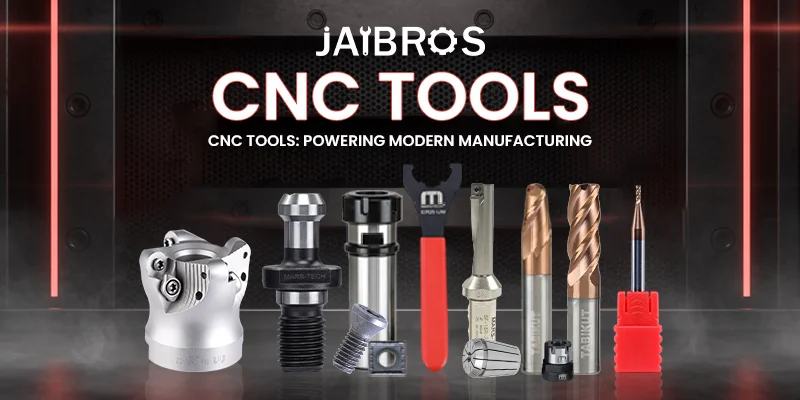How to Maintain CNC Tools for Long-Term Accuracy
In the world of precision manufacturing, CNC tools are the heart of every machining process. They define how accurately and efficiently a product is made. But like any other high-performance equipment, their efficiency and lifespan depend heavily on proper maintenance. Neglecting care can lead to tool wear, poor cutting quality, and increased downtime. To achieve long-term accuracy and performance, regular maintenance of CNC tools is not just an option—it’s a necessity.
Why Maintenance Matters for CNC Tools
Every machinist knows that precision comes from consistency. CNC tools are exposed to high temperatures, vibrations, and friction during continuous operation. Over time, this exposure causes gradual wear, which reduces cutting accuracy. Regular inspection and care ensure that your CNC tools continue to deliver flawless results even after extended use.
Maintenance also helps in preventing costly breakdowns. A well-maintained tool doesn’t just last longer—it also helps your CNC machine run more smoothly, reducing waste and boosting productivity.
1. Keep Your Tools Clean and Free from Residue
Metal chips, coolant residue, and dust can accumulate on the surface of CNC tools, affecting their precision. Cleaning should be done after every machining cycle. Use soft brushes or compressed air to remove small metal particles. Avoid using harsh chemicals that can corrode the tool’s coating.
For shops purchasing from a cnc tools online shop, it’s advisable to check if cleaning accessories or recommended maintenance kits are available to help you extend your tool’s life.
2. Proper Lubrication for Smoother Operation
Lubrication plays a key role in reducing friction and preventing overheating. Always apply the right type and amount of coolant or oil as recommended by the manufacturer. This simple step prevents thermal expansion and improves tool life.
Maintaining proper coolant concentration is just as important. It ensures that your cutting edges don’t become brittle or lose sharpness over time. Many cnc tooling suppliers even provide coolant solutions designed to complement specific tool materials like carbide or high-speed steel.
3. Check for Wear and Damage Regularly
Inspection is one of the most important habits for machinists. Before and after every job, carefully check your CNC tools for wear marks, chipping, or coating damage. Even small imperfections can cause deviations in your final product’s dimensions.
If a tool shows signs of dullness, resharpening should be done immediately rather than waiting for it to fail. Investing time in preventive maintenance saves a lot of downtime and costs later.
4. Store Tools in a Controlled Environment
The environment in which you store your tools can significantly affect their lifespan. Keep your CNC tools in a dry, temperature-controlled area to prevent corrosion. Using foam-lined storage boxes or specialized tool racks helps in avoiding physical damage.
When buying from a cnc tools online shop, ensure that you also purchase proper tool holders and protective cases to keep them in top condition when not in use.
5. Use Correct Tool Holding and Balancing
Improper tool holding can lead to vibration, inaccurate cuts, and uneven wear. Always use high-quality tool holders designed to match the spindle type and tool geometry. Misalignment or unbalanced setups can damage both the machine and the best CNC tools you own.
Balancing not only improves cutting accuracy but also reduces stress on your CNC spindle. It’s an often-overlooked aspect of tool maintenance that plays a major role in maintaining long-term precision.
6. Monitor Tool Performance During Machining
Modern CNC machines often come with software that allows you to track tool performance in real time. Pay attention to feed rate changes, noise, and cutting temperature. These are early indicators of tool wear.
For those who rely on reputable cnc tooling suppliers, you’ll find that many now offer digital monitoring systems or apps that help you schedule timely maintenance and replacements before tool failure occurs.
7. Replace Worn Tools at the Right Time
Even with perfect maintenance, no tool lasts forever. The key to maintaining accuracy lies in knowing when to replace them. Continuing to use dull or chipped tools can affect the entire machining process and compromise your product quality.
Always keep a record of tool usage hours and performance metrics. This helps you decide the right replacement intervals for your CNC tools, ensuring that your production line never suffers from unplanned interruptions.
8. Invest in High-Quality Tools
Preventive maintenance becomes easier when you start with quality products. The best CNC tools are designed with advanced coatings and precision geometry that make them more resistant to wear. Investing in premium tools from trusted brands saves you both time and money in the long run.
Moreover, these high-quality tools often come with manufacturer guidelines and support that help you maintain them more effectively.
9. Work with Reliable CNC Tooling Suppliers
Your relationship with cnc tooling suppliers can make a big difference. Choose suppliers who offer technical support, detailed product specifications, and after-sales services. They can guide you on choosing the right tools for your material type and machining operation, reducing the risk of misuse and early tool damage.
Reliable suppliers ensure consistent quality and help you keep up with the latest tool innovations that improve machining efficiency.
Conclusion: Achieve Long-Term Accuracy with Proper Care
In machining, precision defines success—and that precision starts with how you treat your CNC tools. From cleaning and lubrication to timely replacement and balanced tool holding, every step contributes to longer tool life and better performance. Regular maintenance ensures that your tools continue to perform at their best, saving costs and minimizing downtime.
If you’re looking for durable, precision-driven endmills and other CNC tooling solutions, Jaibros is a trusted name in the industry. They offer a wide range of high-quality CNC tools, accessories, and maintenance essentials that help you achieve consistent accuracy and performance in every project.
FAQ
1. Why is it important to maintain CNC tools regularly?
Regular maintenance of CNC tools ensures consistent cutting accuracy, prevents tool wear, and extends the tool’s lifespan. It also reduces downtime and maintains overall machining efficiency.
2. How often should CNC tools be cleaned and inspected?
Ideally, CNC tools should be cleaned and inspected after every machining cycle. Regular inspection helps detect early signs of wear, chipping, or coating damage, preventing costly errors during production.
3. What’s the best way to store CNC tools safely?
Store CNC tools in a dry, temperature-controlled environment. Use foam-lined storage boxes or tool holders to prevent corrosion and physical damage when the tools are not in use.
4. How can lubrication improve CNC tool performance?
Proper lubrication reduces friction, prevents overheating, and helps maintain smooth cutting operations. Using the right coolant or oil enhances the performance and life of your best CNC tools.
5. Where can I buy high-quality CNC tools and accessories online?
You can purchase precision-grade CNC tooling solutions from a trusted cnc tools online shop or reputed cnc tooling suppliers that offer reliable, high-performance products suitable for long-term use.





